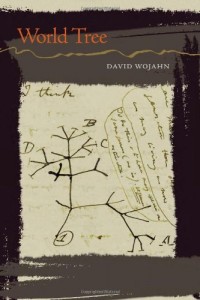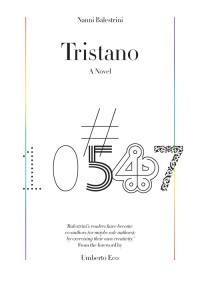World Tree by David Wojahn
 World Tree
World Tree
by David Wojahn
University of Pittsburgh Press, 2011
144 pages / $14.36 buy from Amazon
Rating: 8.5
“The central feature of the human existence is the existence of the unconscious, the existence of a reality of which we are unconscious.”—N.O. Brown
“Poetry, then, is about the extending of human consciousness, making conscious the unconscious, creating a symbolic consciousness that in its finest moments overcomes all the dualities in which the human world is cruelly and eternally, it seems, enmeshed.”—Clayton Eshleman
David Wojahn’s 2011 collection World Tree holds a light to dark stories past and present, expanding new realities from cave walls.
Wojahn looks at places beyond the standard Hollywood or Netflix imagery, (Cystic Fibrosis, ALS, Diabetes, the Anasazi, afterbirth, the foaming sewers of St. Paul, digitized Berryman, green marbles of Cherries in cluster, Helmut province, Houston TX, after Katrina) and with this lot he sounds a white-hot lament. READ MORE >
February 4th, 2014 / 11:09 am
Tristano by Nanni Balestrini
 Tristano
Tristano
by Nanni Balestrini
Verso Books, Feb 2014
128 pages / $25 Buy from Verso Books or Amazon
Bear with me as I use a paragraph to go through what I think is a problem with global leftist thought.
When equality is the ultimate aim of a movement, whether it be economic, social, gender, or any other form, and said equality never historically existed in those areas, the notion of it has to have been constructed in the ideal realm, as opposed to the observable—some might say objective realm (but let’s not go into that)—and could only have come as a reaction against what is actually happening in the real world. So far there is no sign that equality will ever grace us with its presence in the social world in any form, at least not on a large scale, but that’s not to say that the idea doesn’t sell. When movements like the Occupy one fail not as a result of energetic potential, but because of a lack of concise probing into problems with feasible resolutions, this says that a disillusioned segment of the population has the impetus to change economic disparity, but not the means to effectively do so. In other words they’re stuck in ideals, sifting through Verso books, with no reason to believe that these ideals could possibly move into observational reality. But that last part typically gets left out because the most horrifying thought to a progressive movement is the idea that our only real options are stasis or continued decay, that the option of equality is a completely delusional invention used to string us along.
Whether intentional or not (and how, with this book, could I be sure?), reading Tristano, or at least my version of it, numbered 10,672, conjured these thoughts through the annoyed trudge that was the experience of reading this book. The novel is broken up into ten chapters with fifteen paragraphs. The fifteen paragraphs of each chapter are interchangeable and each edition of the book is presented in a different narrative order, making for different possibilities of reading experiences number at 109,027,350,432,000. And like ideas of equality, the expectations are promising and exciting, but the result is disappointing, and precisely for the same reasons. When an idea like equality is stuck in the ideal realm, each individual has a different experience with it, has different notions of how to execute it and different notions what it should be. If this weren’t the case, there wouldn’t be so many different strains of Marxism, or ongoing arguments over precise meanings of his texts, or what should be followed and what not, or even if they should be followed at all. Tristano, too, is individualized for your consumption, but I can guarantee that all versions lead the reader nowhere, that each subjective experience with this text would be similar to the one I had, as equal in their failed executions.
Aside from the numerous possibilities of ordered narratives, there are also uncertainties with the number of characters, what their genders actually are, where a comma should go to make sense of a sentence, where quotations should go and who would be speaking, ultimately placing the most amount of importance on the reader as the most essential character in, and creator of the book. Since the initial readthrough was wrought with indecision and uncertainty, it seems that ideally you’d need to read the novel once so that you would know what decisions you’d need to make for the next time. I’d be surprised if I found anyone who would want to do this, though. As he says near the beginning of my version: “It looks like a very complicated story but with a little patience you manage to unravel the problem. The question is not so much the story itself but rather what effects it might produce what developments it might have what dynamics it might set in motion.” Although this makes sense, and effects are produced, nothing could possibly be set in motion afterwards because all the elements in the story are simply too loose and too vague. I think the intention was to make an experience resembling a Rorschach test, where the reader would input his or her own projections to fill in the empty spaces and cover up the discrepancies. What happened though, at least in my experience, was that I wasn’t concerned with the story. I got lost thinking about what other structures of this book would be like, and the only reason my mind wandered this way resulted from a lack of intriguing themes or narrative or characters to string me along. Loosely the book is a love story, vaguely involving infidelity. With the interchangeable set up presented, nothing winds up getting invested in the reading, and the story reads like a mess of pointless interactions between people or ideas I didn’t care about, like brainstorm scribblings of a bad romance novel.
Even Umberto Eco in his introduction spent more time giving a history lesson on the different uses of combinations instead of discussing the merits of the book. While the mathematical feat is awe inspiring, and the idea one of the most original to come to literature in maybe its entire history, interacting with this text just isn’t interesting. The novel embodies the paralysis of the left, and this failure toward action concerned Balestrini when writing the book. As a member of both Italy’s Gruppo 63 avant-garde collective, along with the Autonomia movement, among other leftist cliques, Balestrini knew first hand the power of state forces against subversive elements, and felt distraught with the lack of effective leftist action. Even if the intention were to expose the inherent powerlessness in the left, is reading this short book—one so overwhelming it’s underwhelming—worth such a simple message that could be illustrated by more stimulating means?
The one thing that I will grant this book is that it is very aware of itself, and by the last chapter, I was somewhat glad that I didn’t give up on it all the times I wanted to. My second to last paragraph went like this:
Even by the end of the book I couldn’t be sure if C was male, female, or if there were multiple Cs, so the romantic aspect, the story at the forefront, just went ignored and the only things left worth concerning myself with were the metafictional aspects and the inactive leftist ideals aware of themselves as inactive that popped up throughout. Tristano, in the end, acts as a fractional artifact of a great idea that just didn’t transfer over into reality well, and it’s sole value lies there. When communism emerged in its initial worldly form as the Soviet Union, it resembled its antithesis—fascism—more than the ideals that spawned it. Perhaps the only message Tristano wanted to get out was this discrepancy between ideals and reality, and that no matter how many combinations we use, none will be the right ones given the tools we’re using. If so, Ballestrini succeeded, but much to my indifference.
February 3rd, 2014 / 10:00 am
Chronicles of the Immediate Present
 Yr Lad, Bob
Yr Lad, Bob
by Sara Peck
Persistent Editions, 2013
$8 Buy from Persistent Editions
The South Carolinian poet Sara Peck has opened, in part, her chapbook Yr Lad, Bob (Persistent Editions, 2013) with a set of phrases that reference two very different experiences of time:
waiting for the train // I’ll always love / you
Waiting, of course, tends to slow time down so much that one becomes aware, almost, of its not passing. And a variety of apprehensions can exacerbate this awareness even more: will the train ever come? Will I be on time when I get where I’m going? Will I be able to do whatever I’m going there for? The feelings waiting can trigger are then contrasted with the line’s next phrase, the promise of which, of always being loved, attempts to mollify all apprehension and impatience. That is, an awareness of how slow time can feel is opposed to a feeling or desire that love will trump time by not ending, which is implicit in the word “always.” Readers of Yr Lad, Bob will find out in the book’s Forward (by poet Lisa Fishman) that single and double slash marks in the text indentify line breaks and stanza divisions in original poems; Peck has culled lines and phrases for her own book from the works of Robert Creeley, Denise Levertov, and Robert Duncan and interspersed these with what were once her reading notes. Here though, as elsewhere throughout Yr lad, Bob, the slash marks serve an additional function: they create silent interruptions which, surprisingly, and unlike commas and other punctuation, do not require the reader to stop or pause; in fact if anything they force the reader on. As a result, the reader accesses moments, phenomena, and feelings which are almost mutually exclusive but which can occur in the poems in one and the same line, or, in terms of the poem read aloud, in one and the same breath. The slash marks allow for the co-existence of things that don’t normally go together, and encountering and experiencing this co-existence is one of the many pleasing things that happens to readers of the book.
Elsewhere in Yr Lad, Bob the slashes touch on time by graphically disrupting colloquial phrases (such as “over and over”) that express repetition if not continuity:
that freshness, over / and over: summer / in the folds of your dress
In examples like these, one begins to see that part of the relineation project of the text is to re-score, or set to new music, a selection of lines by Black Mountain poets. The slashes, however, take us further: look at how they separate the line above into the very tresses or folds on which the line itself ends. It is in moments and places like this that Sara Peck’s chapbook expands the reader’s awareness of time to include an acute awareness of the overall appearance of the page. And such an acute awareness goes far beyond an understanding of reading which views that process solely in terms of signification, that is, in terms of words having the function of conveying something (mental pictures, emotion, information) to a reader or receiver.
As the poems in Yr Lad, Bob gradually shift us from reading to looking, we become, in places, exposed to the raw exchange of sameness and difference which is evidently a core part of language. Even a phrase as simple as
weather / to reassure
is teeming with variation. The first syllable in “reassure” picks up and recycles, as in a mirror reversal, the final syllable in “weather.” The same vowel combination (“ea”) appears in both words, but each time differently, once as diphthong, once as separate syllables. Finally, both words end in “r”-sounds which are close but not exact matches; the sounds cleave toward each other as they fail to overlap perfectly.
February 3rd, 2014 / 10:00 am
R.I.P. Miklós Jancsó
The great Hungarian filmmaker Miklós Jancsó passed away on 31 Jan; he was 92 years old. (The New York Times obit is here.) I first learned about Jancsó from David Bordwell, who wrote a detailed analysis of the man’s 1969 film The Confrontation in Narration in the Fiction Film (some of which you can read here). That film has been difficult to find (though there’s an unsubbed copy at YouTube), but I was able to track down The Round-Up (1966); The Red and the White (1967); Elektra, My Love (1974); and what would quickly become one of my favorite films, Red Psalm (1972):
(Here‘s a detailed essay by Raymond Durgnat of that film.)
Jancsó is perhaps best known for his work in the late 60s and early 70s, which saw him systematically exploring the question of how few takes he could use to make a film, while simultaneously exploring how complex those takes could be in terms of staging. The 87-minute-long Red Psalm consists of 27 elaborately designed shots (see the above clip for an example); in this way, the film was a forerunner of Aleksandr Sokurov’s 2002 single-take feature Russian Ark, as well as Alfonso Cuarón’s recent Gravity. (Cuarón named Jancsó as his primary influence in this Empire interview). Fellow Hungarian Béla Tarr was also much influenced by the man’s work, and has called him “the greatest Hungarian director of all time.”
Despite Jancsó’s significant artistic achievements, he’s been unfairly overlooked by most US film distributors. But some of his work can be found both online and on disc. It’s well worth tracking down.
Sunday Service: Natalie Eilbert
Man Hole
I left him unfinished. I just wanted to.
The snow outside fills the sewers
and like my drive for power will stop abruptly
and soon. Starting now, I’ll drop picture frames
down the hole. Drop food processors and Le Creusets
and my chaste little letters. It’s due to my interest
in godless practices that undoes the ritual.
I have a hole where I store my absent typographies,
I have a hole that will never move outside my body.
When he is beautiful, he adapts to a you-state,
thous his way into my pants to mortify my skins.
He draws me over in charcoal, my dull empty sternum
pinks with creation. I have a hole capable of erasure
and his jaw hangs like a mantis there, there.
Then I make him just once pierced with hundreds of holes.
I make him to preen and prick and prune his skin til he bends in his beautiful stalk.
Then I make him to crave my every sustenance as I fill him with clay and stone and ink.
Here is a mirror to wander through, a hallway to crack over his knee.
I make him to tender my strong arms as I spread him open with my knee.
I give him bloomers. I give him diamonds. I give him my desiccated brainstem
and ask if he’d like to go home now. He digs a hole in the ground and gets in and this makes him mine forever.
*
One definition of a hole is
When men accidentally kill endangered wildlife
they fill the beasts with holes, sew in rocks, sink them in larger holes.
One definition of a hole is
I used to use maxipads against my hole, and I could smell
the perfumed cotton-rot when a man slipped in through my window.
One definition of a hole is
The men have been wiped out. I’ve been given certain allowances
to provide for my species. I miss them. I am Ursula fat and witchy under the sea.
One reason I fantasize about the re-creation of men is because they always admit having loved me when they’re done with me, the heartsick goat in my stomach slaughters itself I am so grateful to fill myself with godawful certitudes as I bleed out. I don’t hear them in the vents. I don’t hear them over me in the dark, emptying. I starve my body still in case it drives them back.
I store them in the hole outside my body. This isn’t my hole but it’s a decent one, keeps them veal-dark and veal-alive. Vials and vials worth of DNA. All these sad engorged wads of dead ocean.
*
My poor man, so full of addendum,
driven through the asphalt to occupy the space
of a shit lake, shit river, shit rat god.
When you are mine you become animate
only capable of burning selfies in the shit lake.
I say when. I say.
And when I close the sepulcher it is done and
you are he again, the agnostic whimpering he.
I place a hole over you, under you, fill it with rock.
Can’t wait to return to my dumb bitch couch
where he is the empty border outside where he is the hole.
The dog presents her dead
to an amnesiac who claims
she was touched by a man
and the touch felt like power
Power is a couch that covers a great hole
The holes I poured you in are becoming legible,
can be read from left to right, up to down, under to over—
The beauty of holes is that I cannot enter one without ceasing to
exist in the seen world. That a body can disappear and become
subsumed by a space suggests that the body is nothing but an act
of spectral negation. My cunt is a star with its darkness pressed to the floor to temporarily light me, to lighten me.
So the channels of men close. The lines of the men close.
I have a sample of spit from the hate of my history and I hock and
I hock and I hock in the holes of my men.
To call a woman a hole is to suggest immediate use.
To call a man a hole suggests grave incivility.
Incivilities I place like a knife at the windowsill to cool.
I’ve set a wishbone in boiling water to watch its holes appear.
When I weep, my calcium brittles. My men limn in sinkholes
until they are again important, until their duress makes me faint in my delicate sovereignty.
*
History is a papertrail that leads to a hole.
My personal history is always such that and that which, a dreadful taxonomy of raining men.
Hallelujah I’ve dug up this adorable patriarchy and it wants to live!
The classrooms of girls offend me with their careful thinking.
Thinking is an act of dipping your hands into a hole that you hope will form a skin.
I have crowned my foreskin a philosopher its rhetoric is so dry.
When he is homely, he is a leader of men and glimmers a brawny integument of he.
He is drawn from the rocks. He rapes a hole in me to fill me with rocks.
My consent is my sinking to the seafloor. Sally sold seawhores by the seashore,
I hum and I hock to the bottom.
The hooked descending albatross is a beauty to behold and I place its carcass like a key
in his gray bloated sternum to bloom itself dry.
When he is homely, a hole forms in his throat for him to speak.
Stones fall out of his crude syntax.
I make him hundreds of times, drill holes behind his temples to make his future exterminations simple. I make his cock hundreds more times, I freeze them mid-revision.
I make him hundreds of times for he is homely and I’ve made him to desire the keen white scalpel again and again.
I make him hundreds of times, let his holes grow dusty from lack of speech.
I make him hundreds of times and he sits on a rock all bashful and glitz.
I make him hundreds of times until he is pretty and worth his weight in flesh.
And in his flesh, I see him, the delicate sovereignty of his limbs.
And when I see him, I scoop out his throat, I take it in the hole and the look in his eyes tells me he’s grateful. I thou him so hard I can feel his fingers wrapping their worth round my neck.
My love is a hole I can only make once. I make it hundreds and hundreds of times.
Bio: Natalie Eilbert’s work has appeared in or is forthcoming from Tin House, Handsome, Guernica, West Branch, Spinning Jenny, Sixth Finch, STOKED, and many others. Her chapbook, Conversation with the Stone Wife, is forthcoming from Bloof Books. She lives and writes in Greenpoint, where she is the founding editor of The Atlas Review.
NICETIES: Aural Ardor, Pardon Me by Elizabeth Mikesch
 Out today from Calamari Press – Niceties: Aural Ardor, Pardon Me by Elizabeth Mikesch
Out today from Calamari Press – Niceties: Aural Ardor, Pardon Me by Elizabeth Mikesch
Niceties debuts today and pokes a hole in the coma of language. The tired factions, lyric versus experience, this tribal cliché, mellifluous pretension, or language generating language, assaulted usually converse by the plain and sneering, story time, popped out of their tepid beers now by a handier relic, just got outmoded – combined to hurt itself inside a voice both beyond and including narration, the personal event broken to the heart’s proper arrhythmia. A flaying can still be vulnerable even if it takes you with it. The sobriety of our times cannot support this book because the general crusade has been swatted operatic. Anything without khakis is giggled about in these great plots for safety so-called artists use to call themselves important. How much precedence might ones pellet-sized message keep in the face of such wrought mystic twirling up the bowel meant for silence? Don’t fret. Mikesch is here to kick you out of your crib and flout the world that hasn’t started. Think those loops Markus swerves us through tied up in a Finnish peninsular whelp, with an elbow caught between each breath, the chorus tapping out a feel good suicide. I don’t want beauty unless it’s clawing me permanent.
